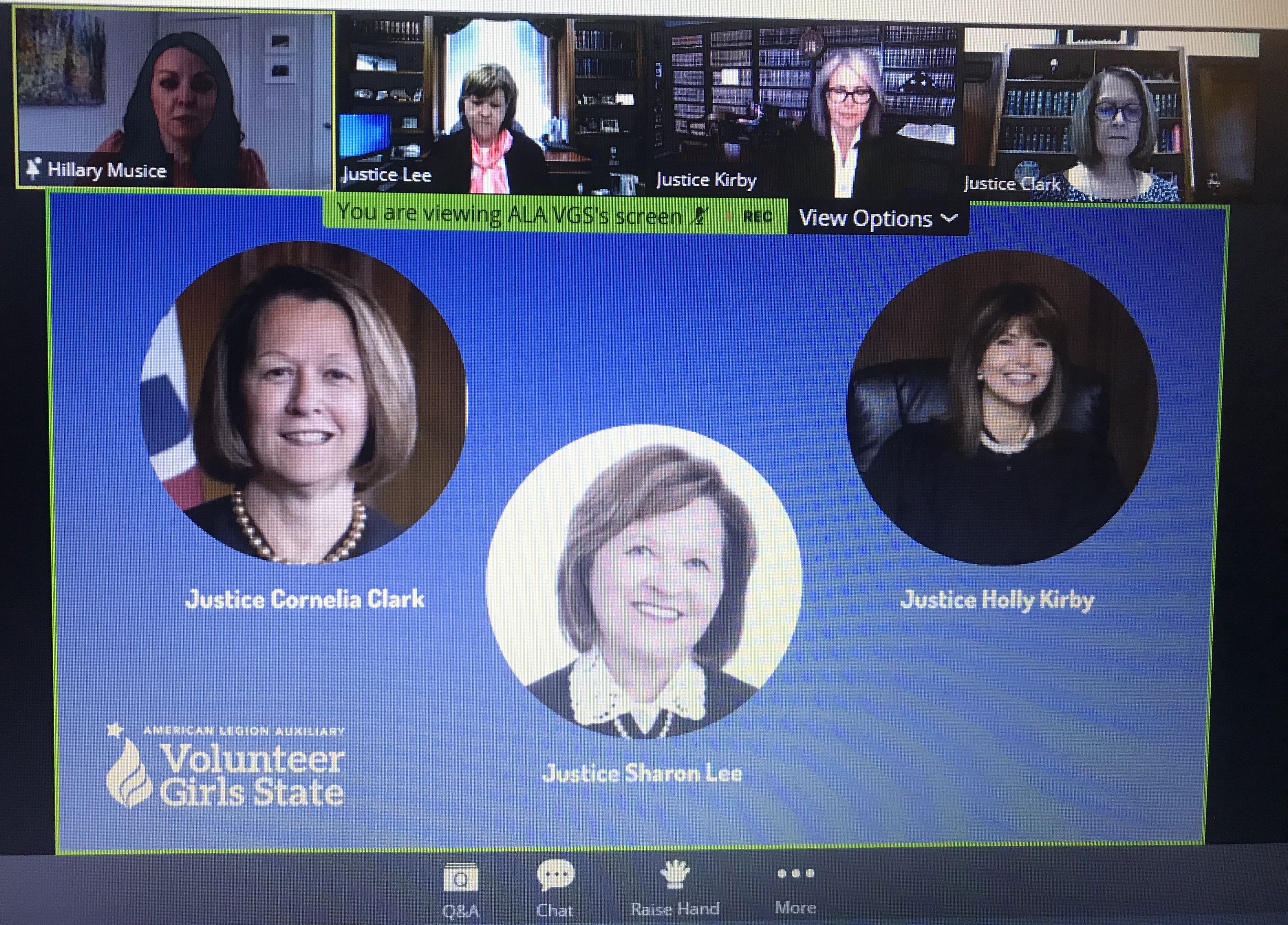One of the highlights of the year for the Tennessee Supreme Court is holding a SCALES (Supreme Court Advancing Legal Education for Students) program at Tennessee American Legion Boys State and American Legion Auxiliary Volunteer Girls State each spring, a day filled with photos with the justices and a live oral argument in a case pending before the Court. Like many things, the COVID-19 pandemic upended this long-standing tradition last year.
But, this year, the organizers of Volunteer Girls State innovated and brainstormed perhaps an even better event for their participants: an hour-long question and answer with the Supreme Court’s three female justices. In true 2021 fashion, the event was held virtually.
Volunteer Girls State is celebrating its 75th anniversary of fostering citizenship, teamwork, and a love for God and country among 575 female high school seniors. During the weeklong program, participants, known as citizens, are broken into “cities” to learn about government and policymaking. One city is named Lee City after Justice Lee, an alumna of the program, a Tennessee Supreme Court justice since 2008, and a former chief justice of the Court.
During the question-and-answer session, the COVID-19 pandemic was, of course, a hot topic for discussion.
“Everyone has been challenged by COVID-19,” Justice Kirby said. “But, the court system is different. Businesses are trying to attract people to choose to come in, but the people who come to court have to be there and they come from all different backgrounds and circumstances. The challenge has been to keep everyone safe when they are required to come to court.”
In total, the Supreme Court issued ten Orders relating to court operations during the pandemic.
“The courts worked every day to ensure we met the constitutional rights of those who came before us,” Justice Clark said. “Bail, divorces, custody orders, these are issues that need to be resolved. We had to balance those obligations with the safety of every one in the system, including court clerks, court reporters, witnesses, and jurors. Proceedings slowed down, but never stopped. I am very proud of what we did and how courts adapted. Many judges and court officers learned new technology so proceedings could go on, but in a safe way.”
The discussion also tackled issues of the day, including the role of judges in protecting voting rights and the importance of voting. Justice Kirby explained that while the legislative and executive branches create the voting systems in a state, it is the courts that mark the outer boundaries of what can be done under both the United States and Tennessee constitutions.
“Our country and our government are stronger when everyone has the right to vote and participates,” Justice Lee said. “Women had to fight long and hard to have the right to vote. There are efforts today to reduce the right to vote or make it harder to vote. We have to watch those efforts. You cannot have a great system and great government when you leave half the people out of the mix.”
The justices were also asked about what the term “rule of law,” popular in today’s media, means to them.
“The rule of law means that our government creates laws in public, not in secret in the dead of night,” Justice Clark said. “They invite citizens to participate, listen to public comments, and follow the constitutional framework. Once that happens and a law is passed, no one is above the law. It also means no one is below the law either. Our country has set minimum constitutional rights and they apply to everyone regardless of their background and circumstances.”
The Volunteer Girls State citizens also asked more personal questions, including if the justices have ever had to write an opinion they did not agree with on a personal or moral level.
“Every week, every month,” Justice Kirby said. “It comes up often.”
The other justices agreed.
“It happens all the time,” Justice Lee said. “We set aside our personal beliefs and reach the decision the law dictates. It is our obligation under the oath we take to interpret the law as the constitution requires even if we don’t agree with it.”
Justice Clark explained that laws are initially presumed to be constitutional.
“The law requires us to assume a law is constitutional,” she said. “It is a far cry to say that a law goes so far passed our constitution that it is unconstitutional. It is not our job to determine if a law is moral or the right policy. We are not legislators.”
The Supreme Court also played a role in Boys State, held virtually last week. Chief Justice Jeff Bivins delivered a video welcome to the delegates.
“The purpose of SCALES is for the students to learn about the courts and see how we operate,” Justice Bivins said. “We wanted to still have an opportunity to have this year’s students learn about the legal system.”
The Boys State delegates watched and discussed the virtual oral arguments of State of Tennessee v. Robert Allison, which involved money-laundering charges and was decided by the Court in January.

